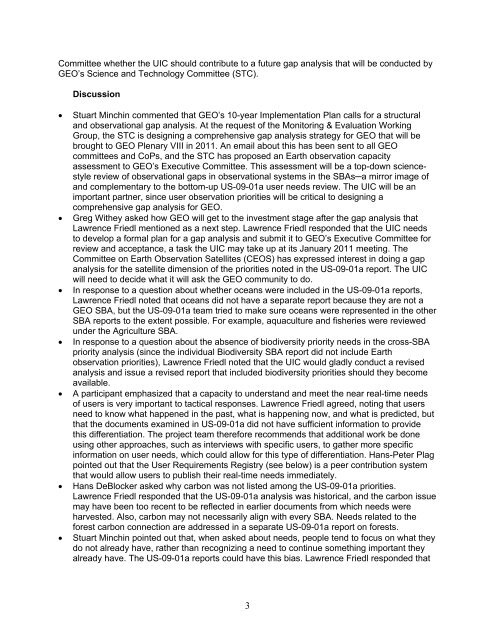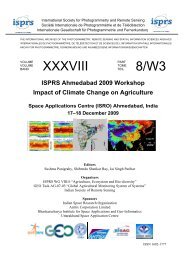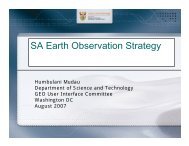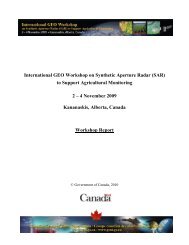GEO UIC Committee: - Group on Earth Observations
GEO UIC Committee: - Group on Earth Observations
GEO UIC Committee: - Group on Earth Observations
Create successful ePaper yourself
Turn your PDF publications into a flip-book with our unique Google optimized e-Paper software.
<str<strong>on</strong>g>Committee</str<strong>on</strong>g> whether the <str<strong>on</strong>g>UIC</str<strong>on</strong>g> should c<strong>on</strong>tribute to a future gap analysis that will be c<strong>on</strong>ducted by<br />
<str<strong>on</strong>g>GEO</str<strong>on</strong>g>’s Science and Technology <str<strong>on</strong>g>Committee</str<strong>on</strong>g> (STC).<br />
Discussi<strong>on</strong><br />
• Stuart Minchin commented that <str<strong>on</strong>g>GEO</str<strong>on</strong>g>’s 10-year Implementati<strong>on</strong> Plan calls for a structural<br />
and observati<strong>on</strong>al gap analysis. At the request of the M<strong>on</strong>itoring & Evaluati<strong>on</strong> Working<br />
<str<strong>on</strong>g>Group</str<strong>on</strong>g>, the STC is designing a comprehensive gap analysis strategy for <str<strong>on</strong>g>GEO</str<strong>on</strong>g> that will be<br />
brought to <str<strong>on</strong>g>GEO</str<strong>on</strong>g> Plenary VIII in 2011. An email about this has been sent to all <str<strong>on</strong>g>GEO</str<strong>on</strong>g><br />
committees and CoPs, and the STC has proposed an <strong>Earth</strong> observati<strong>on</strong> capacity<br />
assessment to <str<strong>on</strong>g>GEO</str<strong>on</strong>g>’s Executive <str<strong>on</strong>g>Committee</str<strong>on</strong>g>. This assessment will be a top-down sciencestyle<br />
review of observati<strong>on</strong>al gaps in observati<strong>on</strong>al systems in the SBAs─a mirror image of<br />
and complementary to the bottom-up US-09-01a user needs review. The <str<strong>on</strong>g>UIC</str<strong>on</strong>g> will be an<br />
important partner, since user observati<strong>on</strong> priorities will be critical to designing a<br />
comprehensive gap analysis for <str<strong>on</strong>g>GEO</str<strong>on</strong>g>.<br />
• Greg Withey asked how <str<strong>on</strong>g>GEO</str<strong>on</strong>g> will get to the investment stage after the gap analysis that<br />
Lawrence Friedl menti<strong>on</strong>ed as a next step. Lawrence Friedl resp<strong>on</strong>ded that the <str<strong>on</strong>g>UIC</str<strong>on</strong>g> needs<br />
to develop a formal plan for a gap analysis and submit it to <str<strong>on</strong>g>GEO</str<strong>on</strong>g>’s Executive <str<strong>on</strong>g>Committee</str<strong>on</strong>g> for<br />
review and acceptance, a task the <str<strong>on</strong>g>UIC</str<strong>on</strong>g> may take up at its January 2011 meeting. The<br />
<str<strong>on</strong>g>Committee</str<strong>on</strong>g> <strong>on</strong> <strong>Earth</strong> Observati<strong>on</strong> Satellites (CEOS) has expressed interest in doing a gap<br />
analysis for the satellite dimensi<strong>on</strong> of the priorities noted in the US-09-01a report. The <str<strong>on</strong>g>UIC</str<strong>on</strong>g><br />
will need to decide what it will ask the <str<strong>on</strong>g>GEO</str<strong>on</strong>g> community to do.<br />
• In resp<strong>on</strong>se to a questi<strong>on</strong> about whether oceans were included in the US-09-01a reports,<br />
Lawrence Friedl noted that oceans did not have a separate report because they are not a<br />
<str<strong>on</strong>g>GEO</str<strong>on</strong>g> SBA, but the US-09-01a team tried to make sure oceans were represented in the other<br />
SBA reports to the extent possible. For example, aquaculture and fisheries were reviewed<br />
under the Agriculture SBA.<br />
• In resp<strong>on</strong>se to a questi<strong>on</strong> about the absence of biodiversity priority needs in the cross-SBA<br />
priority analysis (since the individual Biodiversity SBA report did not include <strong>Earth</strong><br />
observati<strong>on</strong> priorities), Lawrence Friedl noted that the <str<strong>on</strong>g>UIC</str<strong>on</strong>g> would gladly c<strong>on</strong>duct a revised<br />
analysis and issue a revised report that included biodiversity priorities should they become<br />
available.<br />
• A participant emphasized that a capacity to understand and meet the near real-time needs<br />
of users is very important to tactical resp<strong>on</strong>ses. Lawrence Friedl agreed, noting that users<br />
need to know what happened in the past, what is happening now, and what is predicted, but<br />
that the documents examined in US-09-01a did not have sufficient informati<strong>on</strong> to provide<br />
this differentiati<strong>on</strong>. The project team therefore recommends that additi<strong>on</strong>al work be d<strong>on</strong>e<br />
using other approaches, such as interviews with specific users, to gather more specific<br />
informati<strong>on</strong> <strong>on</strong> user needs, which could allow for this type of differentiati<strong>on</strong>. Hans-Peter Plag<br />
pointed out that the User Requirements Registry (see below) is a peer c<strong>on</strong>tributi<strong>on</strong> system<br />
that would allow users to publish their real-time needs immediately.<br />
• Hans DeBlocker asked why carb<strong>on</strong> was not listed am<strong>on</strong>g the US-09-01a priorities.<br />
Lawrence Friedl resp<strong>on</strong>ded that the US-09-01a analysis was historical, and the carb<strong>on</strong> issue<br />
may have been too recent to be reflected in earlier documents from which needs were<br />
harvested. Also, carb<strong>on</strong> may not necessarily align with every SBA. Needs related to the<br />
forest carb<strong>on</strong> c<strong>on</strong>necti<strong>on</strong> are addressed in a separate US-09-01a report <strong>on</strong> forests.<br />
• Stuart Minchin pointed out that, when asked about needs, people tend to focus <strong>on</strong> what they<br />
do not already have, rather than recognizing a need to c<strong>on</strong>tinue something important they<br />
already have. The US-09-01a reports could have this bias. Lawrence Friedl resp<strong>on</strong>ded that<br />
3







